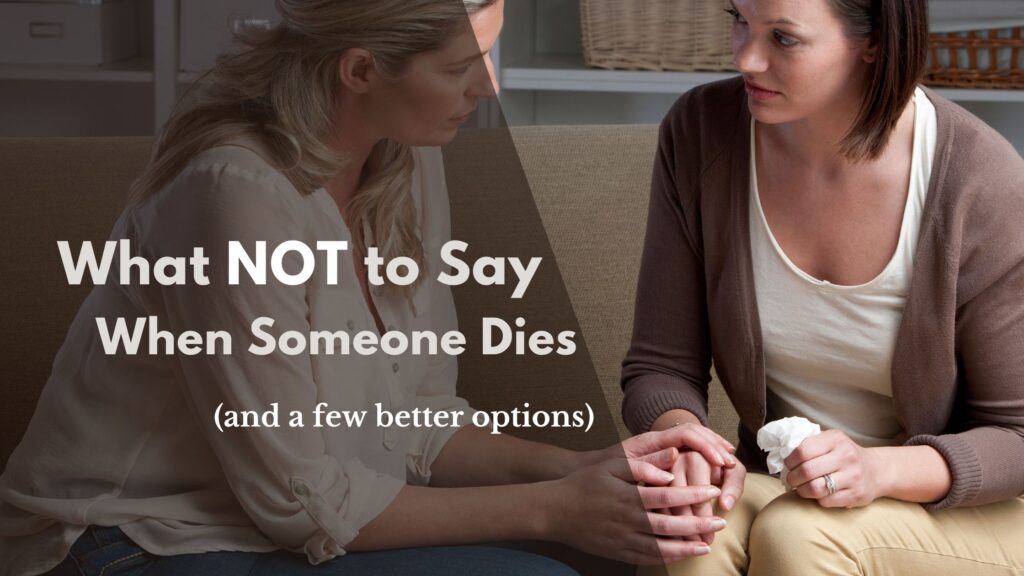It’s a natural desire to offer words of comfort to someone grieving, but most of us struggle because no such words exist, and with only the best intentions, we can say the wrong thing, like:
They’re in a better place.
Even if they believe that to be true, it doesn’t change the fact that they still likely want their loved one to be here with them. Using cliches and platitudes can feel dismissive and make grievers feel like their pain and loss is not significant.
At least…(fill in the blanks.)
Anything that begins with “at least” is neither helpful nor validating. There is a better time to search for silver linings.
Everything happens for a reason.
Many people (myself included) don’t believe everything happens for a reason. Regardless, rationalizing or trying to explain the loss is just not helpful. No matter how or why someone has died, their physical presence is gone, and that just hurts.
Just be grateful for the time you had.
Grievers don’t need to be reminded to be grateful. They are. And they are also sad. It’s not an either/or situation – grief and gratitude can (and do) live in the same breath and beat in the same heart.
Don’t cry. They wouldn’t want you to be sad.
People uncomfortable with their emotions will often say this to others suffering. But as Washington Irving said,
“There is a sacredness in tears. They are not the mark of weakness but of power. They speak more eloquently than ten thousand tongues. They are the messengers of overwhelming grief, of deep contrition, and of unspeakable love.”
Let grievers feel safe to express themselves through their tears.
Maybe it’s time to move on.
A griever can feel estranged when told to “move on,” and the reality of their pain and loss is diminished. Grief has no timeline and no expiry date. Grieving is internal work and a process – a journey we all take and travel in our own time. When it comes to grief, there is no right or wrong. Your grief is your grief.
God doesn’t give you what you can’t handle.
This statement can evoke feelings of guilt and not “doing grief properly.” It can make the griever feel “less than” or unaccomplished and is just not generally a very helpful thing to say.
I know exactly how you feel.
No, actually, you don’t. Even if you’re siblings with the same parent, you don’t know how the others feel when Dad dies (have you watched “Succession?”)
WHAT TO SAY INSTEAD:
Ultimately, simply being there to witness grief and hold space for emotions is enough, but here are a few suggestions if you need to say something.
Tell me about your loved one. What did you love and miss the most?
It can be difficult to ask someone to talk about their loved ones because we worry about upsetting them, causing them to cry or become emotional. But remember that even if they don’t show it outwardly, they are feeling all the feels internally. Providing them with a safe and comfortable space to share stories or memories can be incredibly helpful.
You don’t have to pretend to be ok. I am comfortable with your tears and grief.
In 1993 my youngest son Jamieson was born missing most of his left arm and hand. I grieved terribly for that part of him that never grew and the hand I would never hold in mine. But I suffered quietly and alone for fear of making others uncomfortable, looking weak or ungrateful for the beautiful, healthy baby I had brought into the world. One night while visiting a friend, I quickly wiped a tear away when she sat beside me, put her arms around me and told me that I could cry and that I should cry and that I deserved to cry. I have always been grateful for that incredibly healing moment and the gift of permission to express my grief openly.
I’m so sorry you’re in pain. Do you want to talk about it?
Creating a safe and supportive environment for grievers to express their pain openly can be incredibly helpful. Witnessing their grief can increase their sense of being seen and understood, which can be a powerful and healing experience.
I am often up late, so please call me if you can’t sleep.
That little bit of extra information about being up late (or waking up early) may be the difference between someone suffering all night/early morning alone or having someone there to listen.
It’s ok not to feel ok right now.
Grief is not a problem to be solved. It’s a feeling to be felt. The only way to get through grief is to allow space to grieve.
Remember the time when…?
Letting someone know that you remember their loved one and opening the door for stories and memories to be shared is incredibly helpful.
I cannot take away your grief, but I can support you while you learn to carry it.
Grief is a life-changing experience that cannot simply be “gotten over.” It changes our lives forever, and it takes time to adjust to life without someone and learn to cope and carry the immense weight of grief. We don’t need solutions to take grief away; we need time and space to learn to live (well) with it.
And finally…
Remember that people who are grieving often don’t know what they need, and constantly being asked, “What can I do for you?” can become a burden. Sometimes saying nothing but doing something is most helpful. Offer a hug, mow the lawn, deliver a meal, and hold space for grief and love.
* * *

AUTHOR: LINDA STUART
Linda Stuart is a Life-Cycle Celebrant, Writer and Speaker located in Toronto, Ontario. Specializing in funerals and weddings, Linda’s passion is bringing stories to life through meaningful ceremonies.
You may also like: Are We Dead Wrong About Closure? ** When I Die, Please Do Something ** 10 Things I Wish You Knew About Funerals


Very helpful as I’m always lost for words and currently going through loss of a friend’s daughter
this is extremely helpful and empowering, especially for normal emotions. lots of us forget that all emotions and thoughts are normal and acceptable, it’s your actions that count. you can really place a lot of these into any situation, they’re great mantras to have